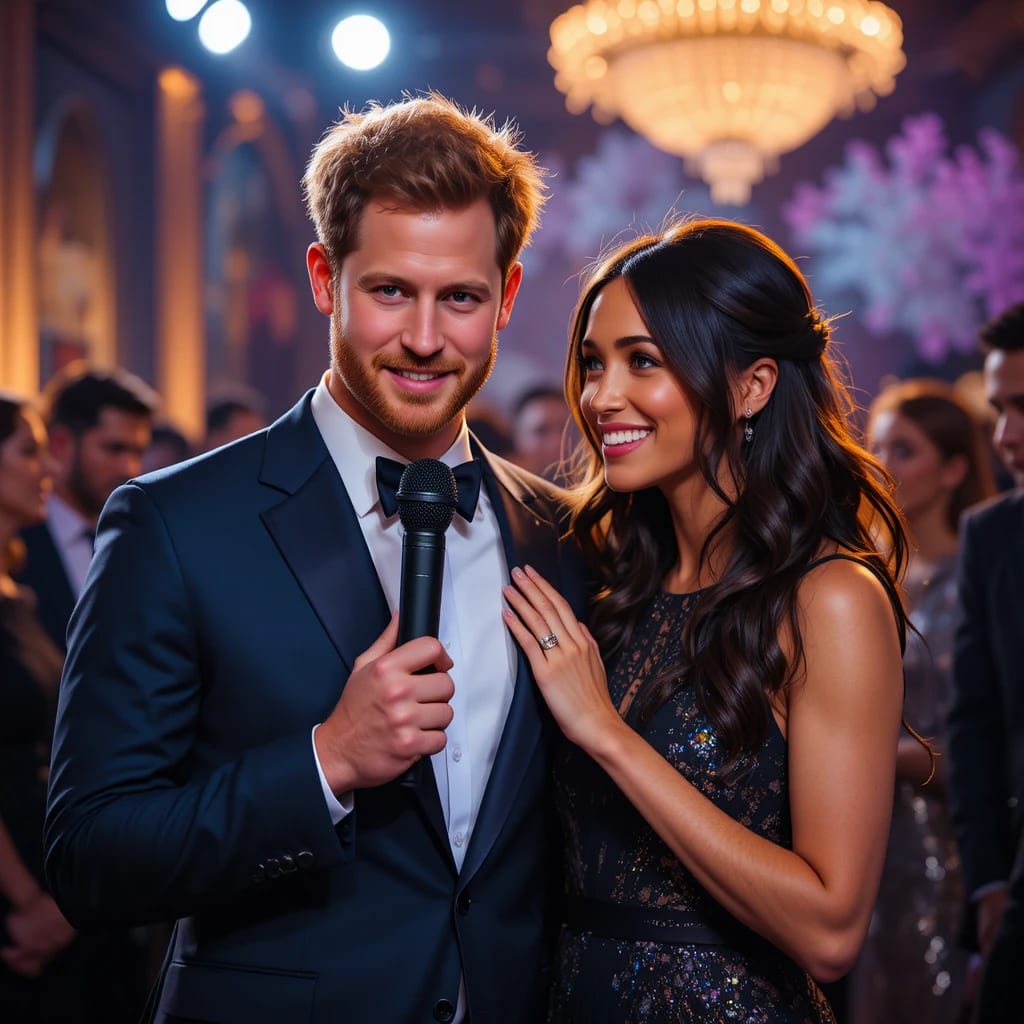Public appearances are often carefully staged, polished, and rehearsed. But sometimes, the most revealing truths slip through in quiet, unscripted moments. At Kevin Costner’s charity event for first responders, a small gesture—a microphone held firmly in Prince Harry’s hands—spoke louder than any speech or headline.
Meghan Markle was not officially on the program. The event’s focus was Harry, introduced with respect among Hollywood stars like Jeff Bridges, Rob Lowe, and Pink. But as Meghan stepped forward, reaching for the microphone, something subtle yet powerful unfolded. The female organizer, who had offered the mic to Harry, quickly shifted and pulled back, leaving Meghan in an awkward limbo.
The crowd noticed. Cameras captured it. The moment passed without drama, but the discomfort was undeniable. Meghan smiled through it, but the energy had shifted. Harry continued speaking, keeping the mic, and the room filled with an unspoken tension. It was not a scandalous argument, nor a public fallout—it was a glimpse into a dynamic that seems increasingly strained.
For years, Meghan commanded attention with effortless charm. Wherever she appeared, the spotlight seemed to follow. But on this night, her presence felt different. Instead of magnetic, it was insistent. Instead of seamless, it was awkward. The audience’s response was muted, their cheers hesitant. The magic that once defined her appearances seemed to falter.
Harry, meanwhile, appeared focused, careful, and perhaps a little restrained. He didn’t rush to hand Meghan the mic, as he might have in the past. His posture was controlled, his words deliberate, his demeanor more reserved than playful. The chemistry they once projected as a united front seemed off-balance, like a dance suddenly out of rhythm.
Observers pointed out how this moment symbolized a larger shift. Harry is increasingly invited to events on his own, recognized for his role and his name, while Meghan is sidelined. For someone who once thrived on global attention, being pushed to the margins must sting. And yet, her attempts to reassert control—through presence, gestures, and smiles—don’t land the way they used to.
Behind the awkwardness lies another layer: the weight of titles and protocol. While Meghan’s Hollywood path is uncertain, Harry remains tied to the invisible strings of royal life. The government of Ukraine, for example, recently addressed him as “His Royal Highness,” a title the palace claimed was stripped away. Subtle acknowledgments like this reveal that Harry hasn’t fully left the monarchy, no matter how much he insists on independence.
This tension—between freedom and obligation, visibility and restraint—is visible in his demeanor. Harry looks weary, his charm tempered, his energy subdued. He stands between two worlds: one in California with its promise of celebrity and independence, and the other in the shadow of royal tradition he cannot fully escape.
For Meghan, the struggle seems more direct. She wants to reclaim the effortless control she once had, to step into the spotlight as naturally as before. But moments like the microphone incident reveal how the charm offensive no longer works as smoothly. What once looked confident now feels calculated. What once drew admiration now creates confusion.
Some reports describe her as forceful, even dictatorial behind the scenes. Whether fair or exaggerated, the perception matters. In Hollywood, reputation is currency. Skipping a high-profile Emmy party hosted by her own agency, WME, only adds to the narrative of decline.
The Kevin Costner event became more than a charity evening—it became a metaphor. A stage too small for two competing energies. A couple once perfectly synchronized, now misaligned. No shouting, no public argument, just subtle gestures, awkward pauses, and the kind of silence that says more than words ever could.
For those watching closely, the cracks are visible. Meghan pushing for recognition, Harry holding back, and both caught in the glare of a spotlight they can no longer fully control. It is not the fairy tale they once promised the world. Instead, it is a complicated dance of relevance, power, and survival.
The world may see the photos—smiles, outfits, public charm. But the confession lies in what isn’t said. The truth hides in the silences, the withheld microphone, the forced smile, the stiff body language. It is in those details that the story of Harry and Meghan is quietly being rewritten, one subtle moment at a time.
